Resolution 57 of 2024 of the Politburo on breakthroughs in science and technology (S&T), innovation and national digital transformation has clearly identified S&T, innovation and digital transformation as the key driving force to bring the country to rapid and sustainable development, realizing the aspiration that by 2045, Vietnam will become a developed, high-income country.
Write your name on the world "map"
During the 80 years of national development, Vietnam's science and technology and innovation have always been the foundation and important driving force for socio-economic development. Immediately after the August Revolution in 1945, despite the country's difficulties, our Party and State soon recognized the role of science and technology in national construction. Research institutes, universities, medical and agricultural facilities were established one after another, both serving the resistance war and laying the foundation for revolutionary science. Achievements in military research, resistance medicine, plant breeding, medicine... have directly contributed to the nation's victory.
After the country's reunification in 1975, science and technology entered a period of strong development in terms of scale and quality. Key programs on electrification, mechanics, chemicals, and biotechnology were deployed to serve the economic recovery. The renovation process opened a major turning point. Accordingly, science and technology was identified as the "top national policy", becoming an important driving force for growth. The legal system on science and technology was gradually completed; many outstanding achievements were born in information technology, telecommunications, high-tech agriculture, medicine, and new materials. Vietnam began to participate more deeply in the international scientific network.
In the context of the fourth industrial revolution, Vietnam has strongly shifted from "application and absorption of technology" to "self-research and innovation". A series of scientific and technological achievements have been reaped in many fields. In 2012, Vietnam's Vinasat-2 satellite was successfully launched into orbit at the Kourou launch site in Guyana (South America). In 2013, Vietnam's first remote sensing satellite VNREDSat-1 was officially launched into space, from the Kourou launch site, French Guyana. In 2019, the Micro Dragon satellite was launched into orbit by the Epsilon No. 4 rocket, marking a major step forward for Vietnamese science in conquering space.
In the field of information technology and telecommunications, Vietnam is among the countries deploying 4G and testing 5G. Along with that, Vietnam proactively produces 11/12 types of vaccines in the expanded immunization program; researches COVID-19 vaccines (NanoCovax, Covivac).
In particular, an innovative startup ecosystem has been formed, attracting thousands of technology enterprises and startups. Making products "Make in Vietnam" with leading enterprises such as VinFast, Viettel AI, Bkav... "Make in Vietnam" products in the fields of artificial intelligence, digital technology, renewable energy, smart agriculture... affirm Vietnamese intelligence in the international arena.
From 2020 to present, Vietnam has promoted the development of science and technology, innovation and digital transformation. E-government, online public services, and digital payments have been promoted. Mastering the technology of manufacturing radar, unmanned aerial vehicles (UAVs), semiconductor chips... In the semiconductor field, FPT has launched chip products in the medical industry, Viettel has designed chips for 5G devices... With drones, CT Group has just signed an export order of 5,000 UAVs to Korea in Seoul.
Vietnam's science and technology, innovation and digital transformation have affirmed its position on the world map. According to the Ministry of Science and Technology, in 2024, Vietnam will rank 44/133 economies in terms of innovation index, up 4 places compared to 2022; international publications will increase by more than 22% compared to 2020; the startup ecosystem will rank 55th in the world, with investment capital reaching 3.45 billion USD in 5 years.
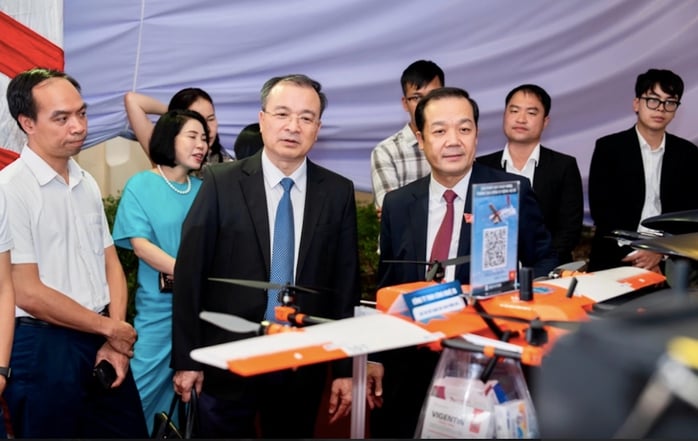
The “Make in Vietnam” unmanned aerial vehicle (UAV) model was introduced to delegates and visitors at the exhibition on the sidelines of the Party Congress of the Ministry of Science and Technology, term 2025-2030. Photo: MINISTRY OF SCIENCE AND TECHNOLOGY
The key to unlocking people's creativity
Not only science and technology enterprises but also many Vietnamese manufacturing enterprises are promoting innovation and digital transformation. Mr. Nguyen Quang Tri, Executive Director of Marketing of Vinamilk, quoted Vinamilk General Director Mai Kieu Lien as saying: "Some people say Vinamilk is too big to change. But if we do not innovate ourselves, we cannot survive."
Accordingly, the company has started its innovation journey with a brand repositioning strategy since July 2023. In 2024 alone, the company launched and renewed more than 125 products and brands; of which 25 are completely new products to meet customer needs. Thanks to its innovation efforts, the international market has achieved double-digit growth, developing 3 more international markets.
"Innovation is not something that only big businesses can do. It is not just about having a lot of money that can innovate. What is important is that innovative businesses are determined to carry out their chosen mission in a better way to meet consumer needs," Mr. Tri shared.
Associate Professor Dr. Do Anh Duc, National Economics University, emphasized that the digital era opens a new stage of development, where digital technology becomes the core driving force for innovation and economic growth. In that context, implementing digital transformation in Vietnam brings both opportunities and challenges. This is the time to take advantage of support from the Government, exploit the potential of modern technology platforms and promote the creative spirit of enterprises. However, this process also faces significant obstacles such as high investment costs, unsynchronized infrastructure, shortage of digital human resources and fear of change.
Therefore, Associate Professor Dr. Do Anh Duc recommends developing programs to support startups in the technology sector to promote high-quality human resources and enhance competitiveness; focusing on investing and upgrading digital infrastructure, building a synchronous national digital infrastructure system, ensuring connectivity, storage, data processing and network security. This includes developing broadband infrastructure, upgrading 4G networks, deploying 5G to promote the Internet of Things and expand business opportunities, especially for small and medium enterprises.
According to Minister of Science and Technology Nguyen Manh Hung, fundamental innovation is science and technology, innovation and digital transformation must aim at the ultimate goal of improving national competitiveness, labor productivity, national governance capacity, economic growth, ensuring national security and defense and improving the quality of life of the people. "Agriculture has helped Vietnam escape poverty, industry has made Vietnam a middle-income country, but to become a high-income country, science and technology must be involved," Mr. Nguyen Manh Hung emphasized.
Minister Nguyen Manh Hung shared: "Over the past 80 years, generations of officials in the science and technology and post and telecommunications sectors have bravely paved the way, built the foundation of knowledge and connected the nation. Our generation today has the mission to continue that journey, with great aspirations, innovative thinking and a spirit of service. We promise not only to master technology but also to create technology; not only to receive knowledge but also to explore new knowledge; not only to build digital infrastructure, promote digital transformation in all fields but also to create a safe, healthy and trustworthy cyberspace for all people to contribute to making Vietnam rise strongly in the digital and knowledge era".
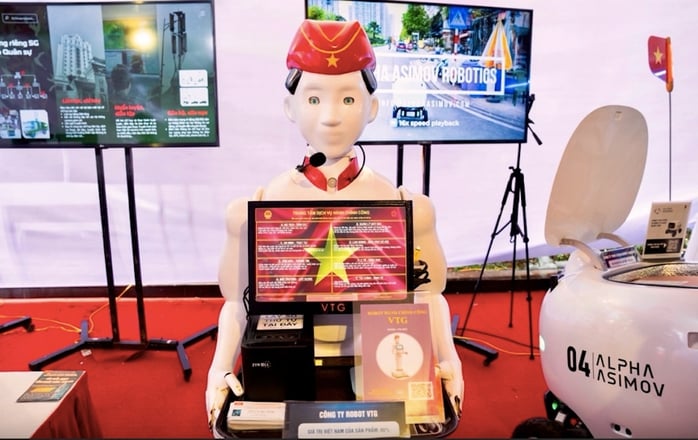
Public administrative robots are displayed at an exhibition on the sidelines of the Party Congress of the Ministry of Science and Technology, term 2025-2030. Photo: MINISTRY OF SCIENCE AND TECHNOLOGY
Contribute at least 50% of GDP growth
During the 2025-2030 term, the Party Committee of the Ministry of Science and Technology aims to develop a knowledge-based economy based on science and technology, innovation and digital data; build technological autonomy in strategic areas; turn Vietnam into an innovation center of the ASEAN region, the continent and the world; build modern infrastructure for the ministry's fields, including science and technology, innovation, post and telecommunications, digital technology industry, intellectual property, quality measurement standards and atomic energy, with special attention to artificial intelligence infrastructure, linked to digital sovereignty and Vietnam's digital position.
Science and technology, innovation and digital transformation must contribute at least 50% of GDP growth...
(To be continued)
___________
(*) See Lao Dong Newspaper from issue dated August 27
Source: https://nld.com.vn/viet-nam-khong-ngung-phat-trien-tang-vi-the-lam-chu-khoa-hoc-cong-nghe-196250827212816003.htm






![[Photo] Binh Trieu 1 Bridge has been completed, raised by 1.1m, and will open to traffic at the end of November.](https://vphoto.vietnam.vn/thumb/1200x675/vietnam/resource/IMAGE/2025/10/2/a6549e2a3b5848a1ba76a1ded6141fae)












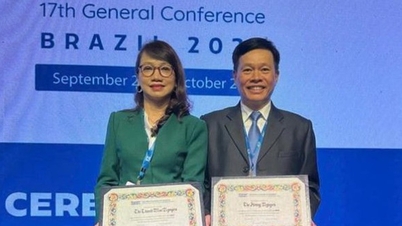

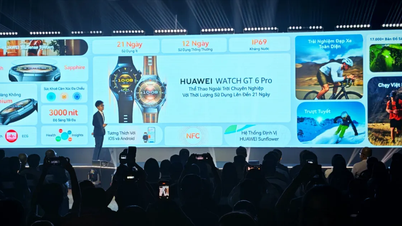















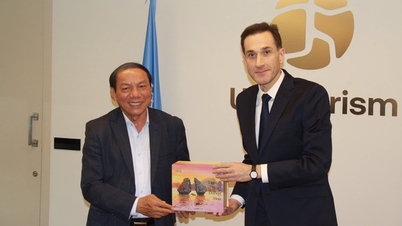


















































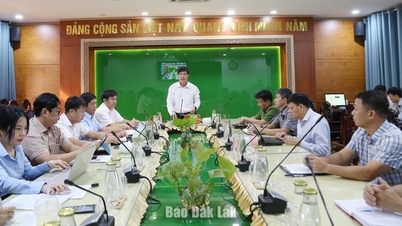
















Comment (0)